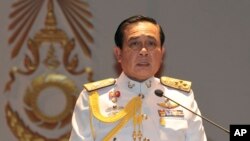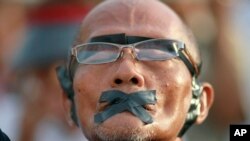BANGKOK —
Army General Prayuth Chan-ocha has ruled out any early general election for the country in a nationally broadcast address late Friday evening.
The leader of the May 22 coup says it will take about a year and three months to accomplish reforms necessary before a nationwide vote.
The general says "a legislative council will be established in order to select a prime minister, appoint a Cabinet to oversee the administration and draft a [new] constitution, as well as set up a reform council to reform all issues that the society desires, acceptable to all groups."
The army chief appealed to the international community to be patient to give him time to carry out the necessary reforms.
He also repeated a warning against trying to protest the military’s takeover, saying such acts will impede his goal of bringing happiness back to the people of Thailand.
General Prayuth seized power just days after declaring martial law and summoning leaders of the major political parties and protest groups to try to broker a solution to Thailand’s long political impasse.
The senior military officers leading the coup quickly detained scores of politicians, including Thailand's previous two acting prime ministers. Academics also have been summoned to turn themselves in to the military, but most have been released after apparently promising not to engage in politics and to remain in the country.
The partly elected Senate, the only functioning legislative body, has been disbanded. A dozen provincial governors and numerous top police officials have also been removed from their posts. In a series of decrees from the National Council for Peace and Order, which General Prayuth now leads, citizens have been warned not to gather in public in groups larger than five people.
The media is under censorship with soldiers monitoring content being broadcast on the major television channels. International news channels, such as BBC and CNN, have been blacked out on cable TV systems.
A nightly curfew remains in effect nationwide despite its adverse effect on the country’s lucrative tourism industry.
A spokesman for the governing military council said the goal of the coup is to eradicate the influence of former prime minister Thaksin Shinawatra, who was ousted in a previous coup in 2006. Parties supported by Thaksin have won every election in Thailand since 2001, and his sister, Yingluck Shinawatra, became prime minister after elections in 2011. Thaksin Shinawatra remains popular among the rural poor, especially in the north and northeast of the country.
Bangkok urbanites and ardent royalists, along with much of the elite in the powerful military, have been strong opponents of the ex-prime minister, a billionaire telecommunications tycoon now in self-imposed exile. He faces prison for a corruption conviction should he return home.
The United States and other countries have called for a swift return to democratic government.
Since the coup, Thailand’s revered ailing 86-year-old king has not made an appearance. But a royal appointment issued in his name was given to General Prayuth, formalizing the army chief’s hold over the government.
Thailand has seen 19 successful or attempted coups since the abolition of absolute monarchial rule in 1932. King Bhumibol Adulyadej, also known as Rama IX, has reigned for nearly 68 years, making him the world’s longest-serving current head of state.
The leader of the May 22 coup says it will take about a year and three months to accomplish reforms necessary before a nationwide vote.
The general says "a legislative council will be established in order to select a prime minister, appoint a Cabinet to oversee the administration and draft a [new] constitution, as well as set up a reform council to reform all issues that the society desires, acceptable to all groups."
The army chief appealed to the international community to be patient to give him time to carry out the necessary reforms.
He also repeated a warning against trying to protest the military’s takeover, saying such acts will impede his goal of bringing happiness back to the people of Thailand.
General Prayuth seized power just days after declaring martial law and summoning leaders of the major political parties and protest groups to try to broker a solution to Thailand’s long political impasse.
The senior military officers leading the coup quickly detained scores of politicians, including Thailand's previous two acting prime ministers. Academics also have been summoned to turn themselves in to the military, but most have been released after apparently promising not to engage in politics and to remain in the country.
The partly elected Senate, the only functioning legislative body, has been disbanded. A dozen provincial governors and numerous top police officials have also been removed from their posts. In a series of decrees from the National Council for Peace and Order, which General Prayuth now leads, citizens have been warned not to gather in public in groups larger than five people.
The media is under censorship with soldiers monitoring content being broadcast on the major television channels. International news channels, such as BBC and CNN, have been blacked out on cable TV systems.
A nightly curfew remains in effect nationwide despite its adverse effect on the country’s lucrative tourism industry.
A spokesman for the governing military council said the goal of the coup is to eradicate the influence of former prime minister Thaksin Shinawatra, who was ousted in a previous coup in 2006. Parties supported by Thaksin have won every election in Thailand since 2001, and his sister, Yingluck Shinawatra, became prime minister after elections in 2011. Thaksin Shinawatra remains popular among the rural poor, especially in the north and northeast of the country.
Bangkok urbanites and ardent royalists, along with much of the elite in the powerful military, have been strong opponents of the ex-prime minister, a billionaire telecommunications tycoon now in self-imposed exile. He faces prison for a corruption conviction should he return home.
The United States and other countries have called for a swift return to democratic government.
Since the coup, Thailand’s revered ailing 86-year-old king has not made an appearance. But a royal appointment issued in his name was given to General Prayuth, formalizing the army chief’s hold over the government.
Thailand has seen 19 successful or attempted coups since the abolition of absolute monarchial rule in 1932. King Bhumibol Adulyadej, also known as Rama IX, has reigned for nearly 68 years, making him the world’s longest-serving current head of state.






